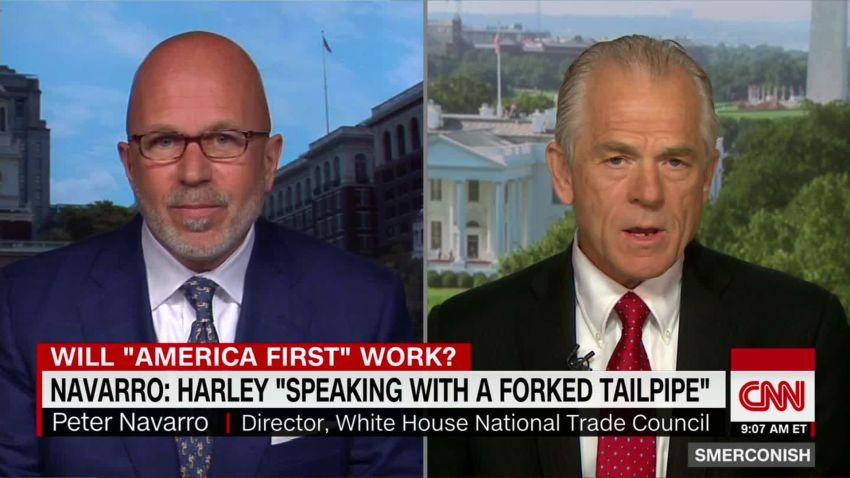Is Trump's Trade Policy Undermining American Financial Dominance?

Table of Contents
This article examines the potential impact of former President Trump's trade policies on America's long-held position of financial global dominance. We'll analyze key policy decisions, their effects on global trade relationships, and the resulting implications for the US economy and its standing in the international financial system. The question remains: did the pursuit of protectionist measures ultimately weaken or strengthen the US's financial power on the world stage?
The Tariffs and Trade Wars
The Trump administration's aggressive use of tariffs as a trade weapon initiated a period of significant trade tensions, often referred to as "trade wars." These actions had profound consequences for the US economy and its global standing.
Impact of Tariffs on Specific Industries
The imposition of tariffs, particularly on steel and aluminum, significantly affected various US industries.
- Agriculture: Retaliatory tariffs imposed by China and other trading partners severely impacted American agricultural exports, leading to losses for farmers and increased prices for consumers.
- Manufacturing: While some sectors might have seen short-term gains from increased domestic demand, many manufacturers faced higher input costs due to tariffs on imported materials, ultimately hindering competitiveness and potentially leading to job losses in the long run.
- Specific Examples: The 25% tariff on imported steel, for instance, led to price increases for US manufacturers reliant on steel imports, impacting their competitiveness in global markets. Similarly, tariffs on Chinese goods resulted in retaliatory tariffs, hurting US exporters.
The impact went beyond simple price increases. The uncertainty created by these trade disputes discouraged investment and hindered long-term economic planning across many sectors. Studies by organizations like the Peterson Institute for International Economics have attempted to quantify these economic costs, highlighting significant losses in GDP and employment.
Disruption of Global Supply Chains
The trade wars triggered significant disruptions to global supply chains, impacting businesses worldwide.
- Increased Costs: Tariffs and retaliatory measures increased the costs of imported goods and materials, impacting businesses' profitability and forcing them to absorb these costs or pass them on to consumers.
- Production Delays: Disruptions to established trade routes and the uncertainty surrounding tariffs led to delays in production and shipping, further impacting businesses' bottom lines.
- Relocation of Manufacturing: Some companies relocated manufacturing to avoid tariffs, leading to job losses in the US and shifting manufacturing capacity to other countries. This negatively affected the US's overall manufacturing output and its global competitive advantage.
Economic Sanctions and Their Consequences
The Trump administration also employed economic sanctions extensively as a foreign policy tool. While intended to pressure targeted countries, these sanctions had far-reaching implications.
Effectiveness of Sanctions as a Foreign Policy Tool
The effectiveness of Trump-era sanctions remains a subject of debate.
- Examples: Sanctions against Iran, North Korea, and Venezuela aimed to curb their nuclear ambitions or address human rights concerns.
- Unintended Consequences: These sanctions often had unintended consequences, affecting innocent civilians and potentially undermining the stability of targeted regions. The impact on humanitarian aid and access to essential goods has been a significant point of concern.
- Impact on International Relations: The unilateral nature of some sanctions strained relationships with US allies who questioned their effectiveness and legality. The sanctions caused friction with international institutions like the United Nations, which advocated for multilateral approaches.
Impact on US Financial Institutions
US financial institutions faced significant challenges complying with the complex and evolving web of sanctions.
- Restrictions on Transactions: Banks had to implement stringent compliance measures, restricting transactions with sanctioned entities, which impacted their ability to operate in certain markets.
- Compliance Costs: The cost of complying with sanctions regulations was significant, requiring substantial investment in compliance infrastructure and expertise.
- Reputational Damage: The risk of non-compliance and potential reputational damage created a significant burden on US financial institutions, potentially limiting their global reach and competitiveness.
Withdrawal from International Trade Agreements
The Trump administration's withdrawal from the Trans-Pacific Partnership (TPP) and its renegotiation of NAFTA (now USMCA) signaled a shift away from multilateral trade agreements.
Consequences of Withdrawing from Agreements
The withdrawal from the TPP had several consequences:
- Loss of Preferential Trade Access: US businesses lost preferential access to markets within the TPP, giving an advantage to other participating countries.
- Impact on US Competitiveness: This reduced US competitiveness in the Asia-Pacific region, allowing other nations to gain a stronger foothold in these markets.
- Opportunities Gained by Other Countries: Countries like China benefited from the absence of the US in the TPP, expanding their economic influence in the region.
Impact on Multilateralism and Global Governance
The Trump administration's approach to international trade agreements significantly impacted US leadership in global governance:
- Diminished US Influence in WTO: The administration's actions undermined the World Trade Organization (WTO), creating challenges for resolving trade disputes and enforcing international trade rules.
- Erosion of International Norms and Rules: The focus on bilateral deals and protectionist measures weakened the international rules-based system governing global trade, potentially causing instability in the long term.
- Impact on Global Economic Stability: The unpredictability of US trade policy under the Trump administration contributed to uncertainty in global markets, affecting investment and economic growth.
Conclusion
Former President Trump's trade policies, characterized by tariffs, sanctions, and withdrawal from multilateral agreements, had a multifaceted impact on the US economy and its global standing. While some argued these policies aimed to protect American industries and jobs, the evidence suggests a complex picture with both intended and unintended consequences. The disruption of global supply chains, increased costs for businesses and consumers, strained international relations, and diminished US influence in global governance raise serious questions about whether these policies ultimately benefited American financial dominance. The long-term effects of these protectionist measures remain to be seen, but the initial indications suggest significant challenges in regaining and maintaining the previous level of American financial influence in the global arena.
Call to Action: Understanding the complexities of Trump's trade policy and its impact on American financial dominance is crucial. Continue your research to form your own informed opinion on this vital issue, considering the wider implications of trade policy decisions and their influence on the US economy. Analyzing the economic data and studying the international ramifications will allow for a more comprehensive understanding of the legacy of this era of trade policy and its lasting impact on American financial strength.

Featured Posts
-
 Post Easter Truce Renewed Hostilities In The Russia Ukraine War
Apr 22, 2025
Post Easter Truce Renewed Hostilities In The Russia Ukraine War
Apr 22, 2025 -
 Is Betting On Natural Disasters Like The Los Angeles Wildfires The New Normal
Apr 22, 2025
Is Betting On Natural Disasters Like The Los Angeles Wildfires The New Normal
Apr 22, 2025 -
 Hegseths Signal Chat And Pentagon Chaos A Growing Controversy
Apr 22, 2025
Hegseths Signal Chat And Pentagon Chaos A Growing Controversy
Apr 22, 2025 -
 Swedens Tanks Finlands Troops A Pan Nordic Defense Force
Apr 22, 2025
Swedens Tanks Finlands Troops A Pan Nordic Defense Force
Apr 22, 2025 -
 Harvard And The Trump Administration A 1 Billion Funding Dispute
Apr 22, 2025
Harvard And The Trump Administration A 1 Billion Funding Dispute
Apr 22, 2025
